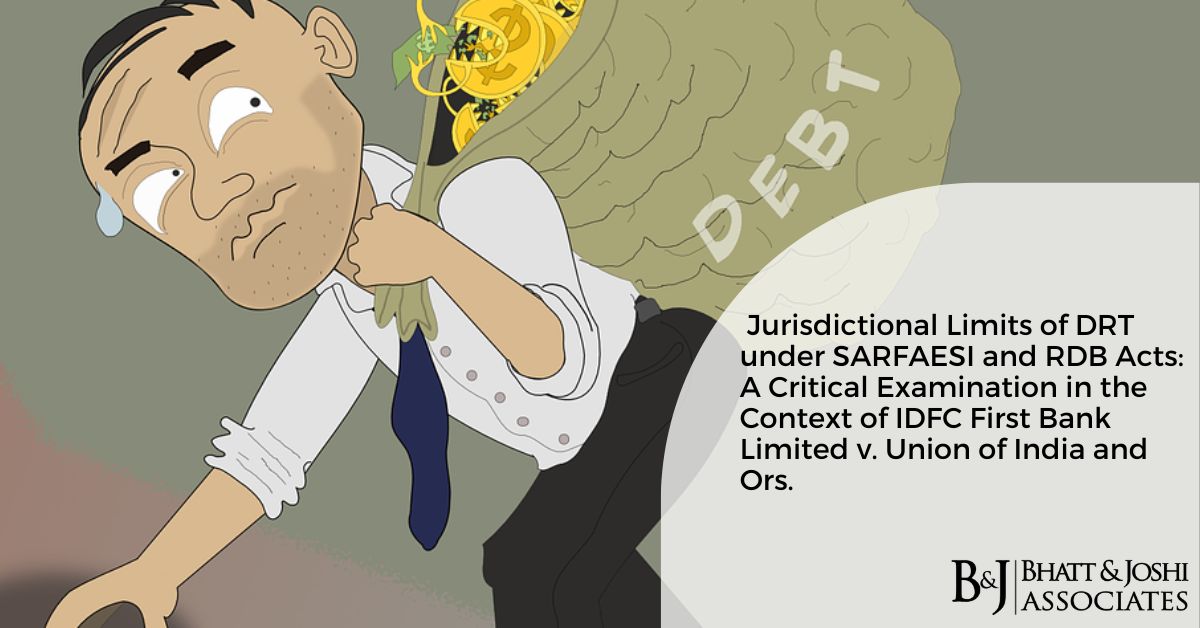
The Delhi High Court recently delivered a seminal judgment in the case of *IDFC First Bank Limited v. Union of India and Ors.*, clarifying the jurisdictional bounds of the Debt Recovery Tribunal (DRT) under the Securitisation and Reconstruction of Financial Assets and Enforcement of Security Interest Act, 2002 (SARFAESI Act), vis-à-vis the Recovery of Debts and Bankruptcy Act, 1993 (RDB Act). This judgment is pivotal in understanding the applicability of pecuniary limits to claims pursued under the SARFAESI Act and delineates the interplay between the SARFAESI and RDB Acts.
The Core Issue
The court was tasked with determining whether DRTs could entertain claims under Section 13(10) of the SARFAESI Act that are below the pecuniary threshold set by the RDB Act. The question arose from IDFC First Bank Limited’s challenge against the DRT’s decision, which rejected their application for recovery of an outstanding amount under the SARFAESI Act on grounds of lacking pecuniary jurisdiction.
Factual Background
IDFC First Bank entered into a loan agreement, which eventually led to a non-performing asset classification. Upon the sale of secured assets and adjustment of proceeds, a balance amount remained, for which the bank sought recovery under Section 13(10) of the SARFAESI Act. The DRT’s refusal, citing jurisdictional limits, prompted the legal challenge.
“The principal question to be addressed is whether the Debts Recovery Tribunal has the jurisdiction to entertain a claim for less than ₹10,00,000/- under Section 13(10) of the SARFAESI Act.”
Legal Analysis: DRT Jurisdiction under SARFAESI & RDB Acts
IDFC contended that Section 13(10) of the SARFAESI Act provided an independent remedy and should be distinguished from the RDB Act’s provisions. In contrast, the respondent argued that any outstanding amount, post-sale of secured assets, could be recovered under the RDB Act, emphasizing the pecuniary threshold defined therein.
The court meticulously analyzed the statutory framework, emphasizing the integral relationship between the SARFAESI Act and the RDB Act in adjudicating claims related to debt recovery. It underscored the absence of express provisions within the SARFAESI Act specifying which DRT would hold jurisdiction over original claims following the enforcement of security interests.
“The SARFAESI Act does not contain any express provisions that stipulates which Debts Recovery Tribunal has the jurisdiction to decide any original claim as to the outstanding amount that remains after the secured creditor has enforced the security interest.”
Quoting directly from the SARFAESI Act, Section 13(10) states:
“Where dues of the secured creditor are not fully satisfied with the sale proceeds of the secured assets, the secured creditor may file an application in the form and manner as may be prescribed to the Debts Recovery Tribunal having jurisdiction or a competent Court, as the case may be, for recovery of the balance amount from the borrower.”
Conclusion: DRT Jurisdiction Clarified under SARFAESI & RDB Acts
The judgment firmly established that the remedy under Section 13(10) of the SARFAESI Act cannot be considered in isolation from the RDB Act. It elucidated that applications under Section 13(10) for recovering the balance amount are inherently akin to Original Applications under Section 19(1) of the RDB Act, thereby subject to the same pecuniary limits.
“An application under Section 13(10) of the SARFAESI Act is required to be adjudicated as an Original Application under Section 19(1) of the RDB Act and is subject to the pecuniary limits therein.”
The court’s decision underscores the integrated nature of debt recovery laws in India, affirming that DRTs’ jurisdiction under the SARFAESI Act aligns with the pecuniary thresholds outlined in the RDB Act. This clarification harmonizes the procedural aspects of both acts, ensuring a streamlined approach to debt recovery and enforcement of security interests, thereby reinforcing the legislative intent behind these statutes.













